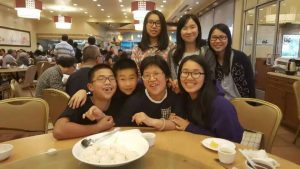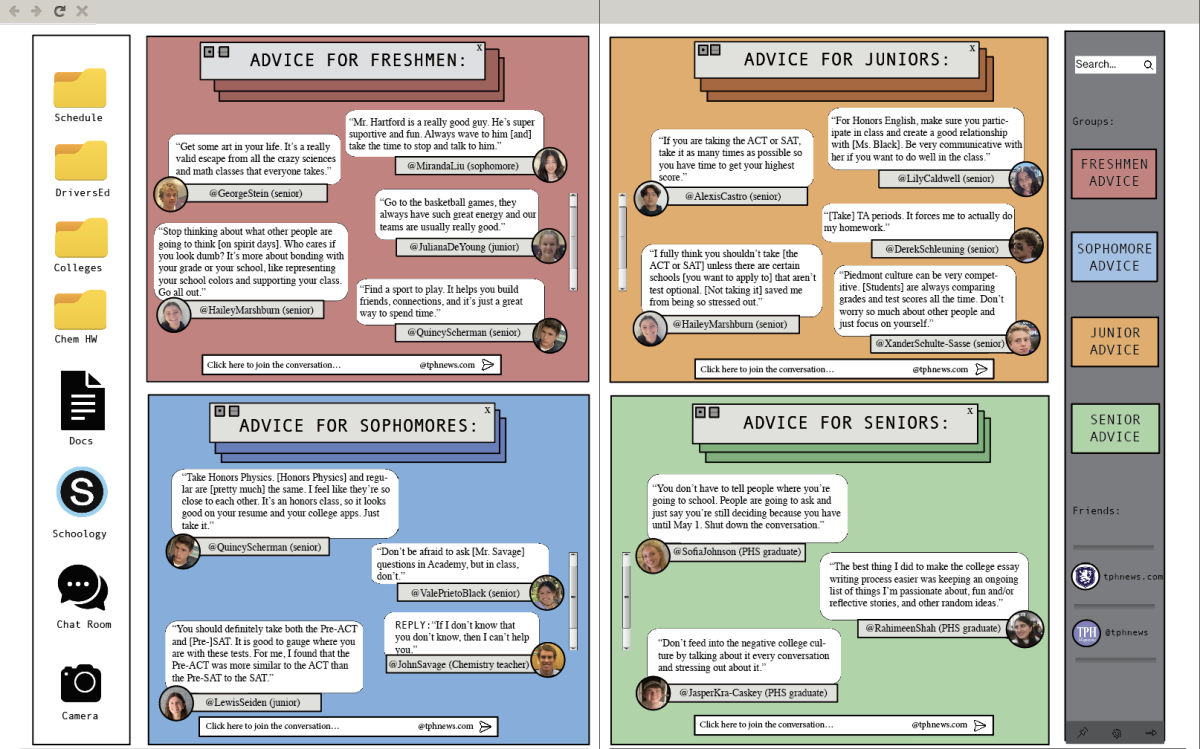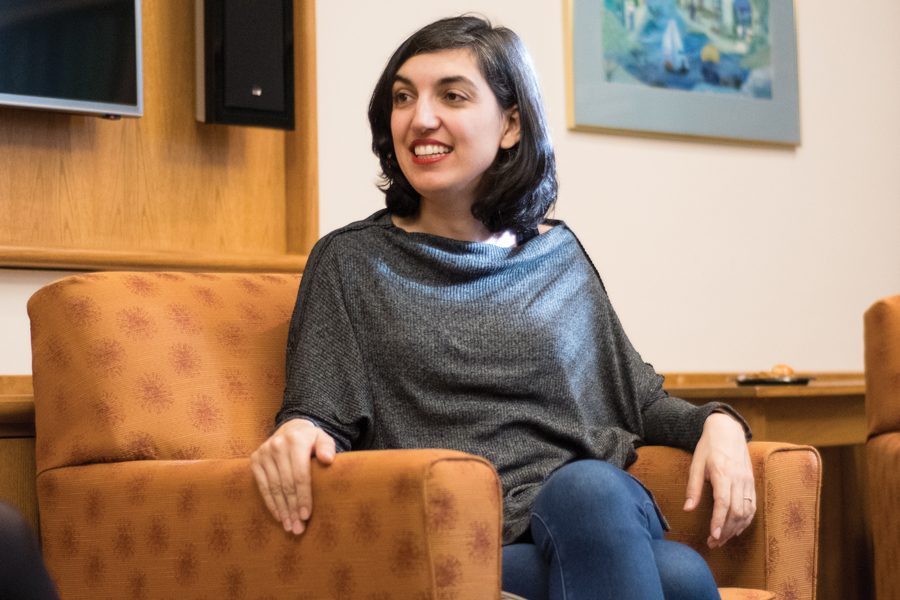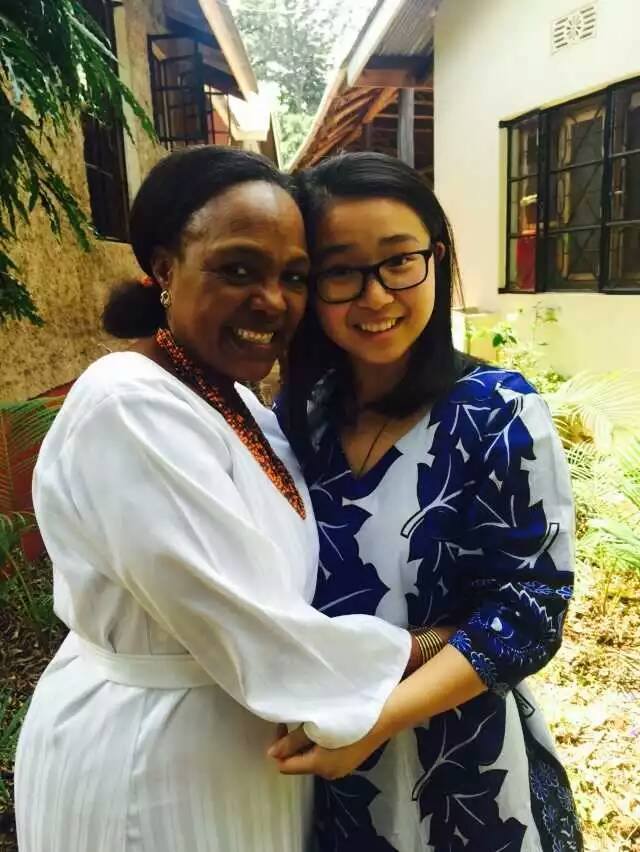The Chinese words “zhong” and “shan” together — the name of a small city in southern China — translates word-for-word to “the center of the mountain.”
The Italian word “piemonte” means at “the foot of the mountain.”
In this sense, junior Tong Zhou left the center of the mountain for the foothills five years ago and enrolled in Piedmont Middle School to explore the fertile valley that is the American education system.
Before that, Zhou was a seventh grader at a private school in Zhongshan. She came to America with her older sister, Ying, but not with her parents, staying instead at the home of her cousin, junior Angela Zhou. Angela stayed with her in every class, translating instructions into Chinese and helping her adjust.
 “My second year [in Piedmont] I started to understand what’s going on so I can talk to other people, but the first year I kind of only talked to Angela,” Tong said.
“My second year [in Piedmont] I started to understand what’s going on so I can talk to other people, but the first year I kind of only talked to Angela,” Tong said.
For non-English speaking students, that lack of language skills can breed the perception that they are quiet and antisocial, said Tong. For her, part of this was simply adjusting to American culture. She notices that her younger siblings, having spent a larger portion of their lives in America, assimilate more and defy the quiet Chinese stereotype.
“I don’t talk to people unless they talk to me,” Tong said. “I don’t really want to talk, unless I have a question to ask. It’s kind of different for me. My sister is more open, happier and talks to everyone.”
Tong observed the even greater effect of assimilation in her two brothers, including one in seventh grade at PMS.
“They are more American now,” Tong said. “First of all they don’t speak Mandarin as well as before, and they are more open and have more of their own ideas, instead of at the beginning when they would always listen to us.”
Tong’s older sister encountered similar problems with English, despite having learned it for longer back in China.
“But it doesn’t mean you can listen and understand more, because back in China they speak English very slowly, so you can understand it, but here people speak quite fast,” Tong said.
Tong’s younger sister, freshman Joy Zhou, who arrived in Piedmont with her mother and brothers a year after Tong, had a similar experience to Tong.
“In fifth grade, half of the year I didn’t even talk, I just listened and did the homework,” Joy said. “I always needed to use a translator. In sixth grade I listened more and encouraged myself to talk.”
Besides English, the biggest transition for Tong revolved around the American education system and its style of teaching.
“Teachers here always ask, ‘Why?,’ and back in China my teachers only ask, ‘What?” Zhou said.
But that greater focus on critical thinking skills over memorization was also part of the draw for Tong and her family.
“If I did not come, then I would go to middle school and high school in China, and then I’m going to have to try very, very hard,” Tong said. “Since there are so many people to compete, there’s less chance to get into a college in China.”
For Joy, this style of education was also representative of the greater amount of freedom allowed by the American system.
“Here people tend to hang out with friends a lot,” Joy said. “In China you’re kind of just stuck there, and I didn’t really have any free time to do anything besides school. The way of education is really different too. Here, it’s more you get to choose what you want to do, which path you’re going to take, but in China they kind of shape you in a way to get into a better college.”
Beyond a different teaching style, Tong was also used to staying in the same classroom, with the same classmates and teacher, for every class. Even physical education in America required some adjusting to.
“Back in China it was more of an academic focus, so I think 400 meters was the most they run,” Angela said.
Despite all the challenges, Angela said Tong offers different perspectives inside and outside the classroom.
“Her teachers were kind of unfamiliar with teaching people who don’t speak English,” Angela said. “But she was very willing to ask questions and very willing to learn, and I don’t think China’s education system hindered her in any way.”
Part of the emphasis on rote memorization is the most dreaded part of a Chinese education: taking the gaokao, a state-administered standardized test held once a year and that is essentially the only determining factor taken into account for the college admissions process in China.
Tong wanted to avoid the crushing pressure and intense cramming of taking such a test, as well as ending up on a path similar to one of her cousins, who took the gaokao but did not get a high enough score for a top school, and ended up deciding to transfer to an American college after one year at mid-tier Chinese one.
“If you really want to get educated and be the best, then China is very very tough,” Tong said.
Despite Tong’s initial difficulties, she is still happy to have come to America.
“It was a new experience living with them, but I think it was good cultural exchange,” Angela said. “I think for lots of people who immigrate from a different country, America is a very, very different country, as in it’s really hard to adapt to the culture here and understand the people.”










































